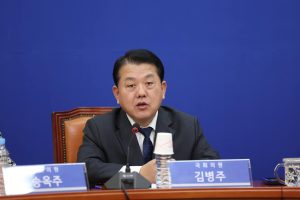On December 7, South Korea’s parliament voted on an impeachment motion filed by opposition parties against President Yoon Suk-yeol, accusing him of insurrection following his abortive martial law declaration earlier last week.
The vote, which began at 5 p.m. and stretched into the evening, ultimately fell short of the 200-member quorum required in the 300-seat National Assembly. The number of lawmakers casting votes stalled at 195, rendering the motion void.
To pass the motion, the opposition needs two-thirds of the chamber’s support, which requires at least eight lawmakers from the ruling party to break ranks.
Amid growing discord, the main opposition Democratic Party (DP) continues to push for Yoon’s swift resignation or impeachment, while the ruling People Power Party (PPP) explores alternative strategies to address the situation.
What comes next, and how will domestic turmoil shape the broader political landscape? The Diplomat conducted an exclusive interview with Kim Byung-joo, a senior parliamentarian from the DP and member of the National Defense Committee, for insights. A retired four-star Army general, Kim was the first to interview key military figures involved in last week’s martial law decree.
Why do you think President Yoon declared martial law?
Yoon appears to have imposed martial law with the mindset of an imperial autocrat, attempting to resolve his problems through military might rather than political means. He has been facing a mounting crisis, beginning with his sinking popularity. Last week alone, there was yet another vote seeking a special counsel investigation into First Lady Kim Keon-hee, and an official inquiry started into the death of former Marine Chae Sang-byung. An impeachment motion against a chief state auditor was also recently passed. [The auditor has reportedly taken a favorable stance toward the Yoon administration.]
You learned that an arrest team was being formed. Can you elaborate?
According to a reliable source, Yoon Suk-yeol and former Defense Minister Kim Yong-hyun assembled an elite “arrest team” of around 20 individuals from the special forces of the Defense Intelligence Command, otherwise known as HID. It is highly suspected that if martial law had not been lifted, these elite forces would have been mobilized to arrest numerous politicians and opponents, including Representative Lee Jae-myung [the leader of the DP].
The motion to impeach President Yoon failed on Saturday. What are your thoughts?
On December 3, Yoon Suk-yeol abruptly declared emergency martial law and sent military troops to the National Assembly. These troops pointed firearms at civilians and attempted to seize the building by force. This is a clear act of insurrection, undermining the very foundations of our constitution and democracy.
President Yoon Suk-yeol is a criminal offender of insurrection and, without question, should have been impeached. Impeachment alone is insufficient. He must be arrested and thoroughly investigated.
The failure of the impeachment bill to pass lies squarely with the ruling People Power Party, which abstained from the vote in parliament. Such a decision positions the party as the “defender of a criminal offender of insurrection.” History will condemn them for prioritizing their own vested interests over the people’s will.
For the motion to pass, the opposition must convince eight lawmakers from the PPP to support it.
Right now, the People Power Party and the Yoon administration resemble a massive ship sinking due to a large hole in its hull. As water begins to pour in, the ship sinks faster. I believe the growing public anger will only widen the hole, and by the end of December, the ship will inevitably submerge.
The PPP has proposed an alternative to impeachment, saying that Yoon would step down early (but at an unspecified date) and in the meantime the PPP and prime minister would exercise all presidential authority. How do you view their plan?
Those options are not even up for negotiation. We, the Democratic Party, firmly believe impeachment is the only viable solution. The reason is simple: The greatest risk South Korea faces right now is President Yoon himself. As long as he remains in office, the people of our country will live in constant insecurity, unable to sleep peacefully at night.
Yoon may well declare a second martial law order or escalate tensions with North Korea and trigger a limited war. By law, Yoon remains the commander-in-chief, and no one can predict his future actions. He is a ticking time bomb. The only way to prevent him from causing further damage is through impeachment or immediate resignation.
Right now, impeachment is the only definitive way to halt his power and stop the ongoing crisis. This Saturday, I urge the People Power Party members to join hands to ensure impeachment happens.
How might the political instability in South Korea affect its global standing?
As long as Yoon remains in power, it will have a profound and negative effect on South Korea’s foreign affairs and security. What Yoon has done recently is tantamount to insurrection, which significantly undermines the democratic foundations of our country.
This will have a lasting effect on critical alliances, such as with Washington. For the U.S., maintaining a strong partnership with a government that undermines democracy is challenging, as liberal democracy is one of its core values. While the alliance will persist, it will inevitably become less intimate than before. Furthermore, this situation will cast a dark shadow over South Korea’s democratic friends, and the global community will grow increasingly uneasy about our instability.

































